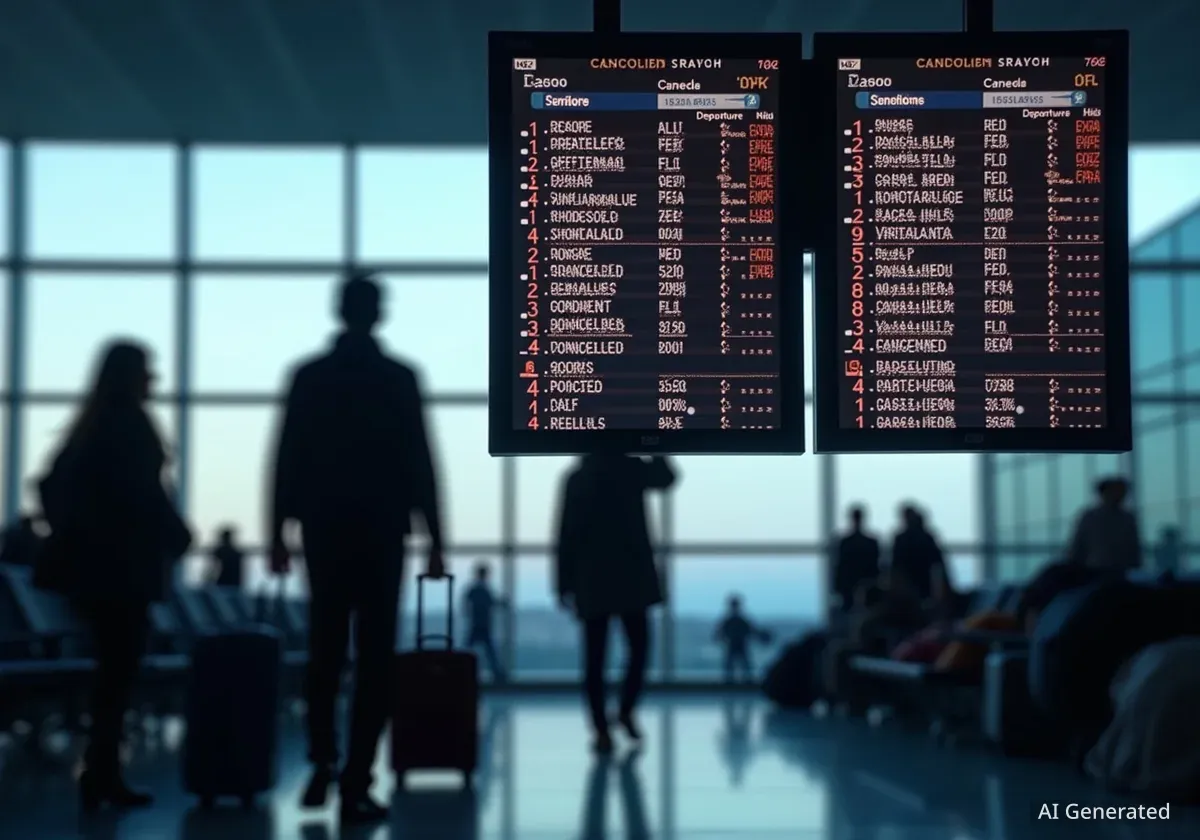Thousands of travelers across Europe are facing significant disruptions after major airlines canceled at least 67 flights. These cancellations, attributed to operational challenges, have impacted routes in Ireland, Denmark, the United Kingdom, Greece, and the Netherlands, leaving passengers stranded in busy airport terminals.
The widespread cancellations are causing extensive delays, overcrowding, and growing frustration for individuals trying to reach their destinations during a peak travel period. Affected airlines include SAS, British Airways, Brussels Airlines, Lufthansa, and KLM, among others.
Key Takeaways
- Over 67 flights canceled by major European airlines.
- Thousands of passengers stranded across five countries.
- Operational challenges cited as the reason for disruptions.
- Airports in Dublin, Copenhagen, London, Athens, and Amsterdam heavily impacted.
- Travelers advised to check flight status and rebooking options.
Widespread Disruptions Across Key European Hubs
The cancellations have created a ripple effect throughout Europe's busiest travel hubs. Airports in Dublin, Ireland; Copenhagen, Denmark; London, UK; Athens, Greece; and Amsterdam, Netherlands, are experiencing the most severe impact. These locations are already handling high volumes of traffic, and the added cancellations have led to substantial delays and crowded facilities.
Many travelers had planned their trips in advance, and these sudden changes are causing considerable inconvenience. Some passengers face additional financial burdens and extended waiting times as they try to secure alternative travel arrangements.
Cancellation Data
- Total Flights Canceled: At least 67
- Affected Countries: Ireland, Denmark, UK, Greece, Netherlands
- Airlines Impacted: SAS, British Airways, Brussels Airlines, Lufthansa, KLM
- Highest Cancellations: KLM reported the highest number of grounded flights.
Impact on Passenger Travel Plans
For those connecting to international flights or traveling to popular tourist spots, these cancellations mean significant changes to their itineraries. Thousands of individuals are now stranded, actively searching for new ways to complete their journeys.
Airport customer service counters are seeing long queues and increased congestion. Passengers are attempting to rebook flights, but the demand for re-routed travel is overwhelming. This situation is particularly challenging during a period when many people are traveling for holidays or business.
"The situation is causing immense stress for travelers. We are seeing unprecedented queues at rebooking desks," said an airport official in London.
Airline Responses and Passenger Advice
Airlines, including KLM, SAS, and Brussels Airlines, are working to assist stranded passengers. They are making rebooking options available, but travelers should expect long wait times. The volume of requests is high, and airlines are scrambling to manage the backlog of affected passengers.
Airports are strongly advising all passengers to regularly check their flight statuses before heading to the airport. They also recommend staying informed about any updates from their specific airlines. This proactive approach can help minimize further frustration and delays.
Peak Travel Challenges
These flight disruptions occur at a time when European airports are already managing large numbers of passengers. The summer travel season often brings increased demand, which can strain operational capacities. Staff shortages, air traffic control issues, and unexpected maintenance can all contribute to operational challenges during busy periods.
Alternative Travel Options
With flights canceled, many travelers are looking at alternative transportation methods. Train and bus services are experiencing higher demand as a result. However, these alternatives are also becoming overwhelmed, making it difficult for some passengers to find immediate solutions.
Passengers needing to rebook flights are urged to consider their options carefully. Flexibility with travel dates and routes may be necessary, especially during high-demand periods. Direct communication with airlines through their official channels is essential for receiving accurate and timely information.
Ongoing Challenges and Future Outlook
The widespread cancellations are expected to continue causing a ripple effect across the European travel network. Delays and congestion are likely to persist in airports throughout the affected countries. The full extent of the impact on scheduled flights and passenger journeys may take several days to resolve.
Travelers should prepare for potential further disruptions and remain patient. Airlines and airport authorities are working to restore normal operations, but the process is complex due to the sheer volume of affected flights and passengers. Staying informed and planning for contingencies are key for those traveling in the coming days.
- Stay Updated: Check airline websites and official airport announcements.
- Contact Airlines: Use airline customer service for rebooking, but expect delays.
- Consider Alternatives: Explore train or bus options, but be aware of increased demand.
- Plan for Delays: Allow extra time for travel and airport processes.
The current situation highlights the vulnerabilities in the air travel system during peak demand. Operational issues can quickly escalate into major disruptions for thousands of travelers, affecting their plans and causing significant inconvenience.





